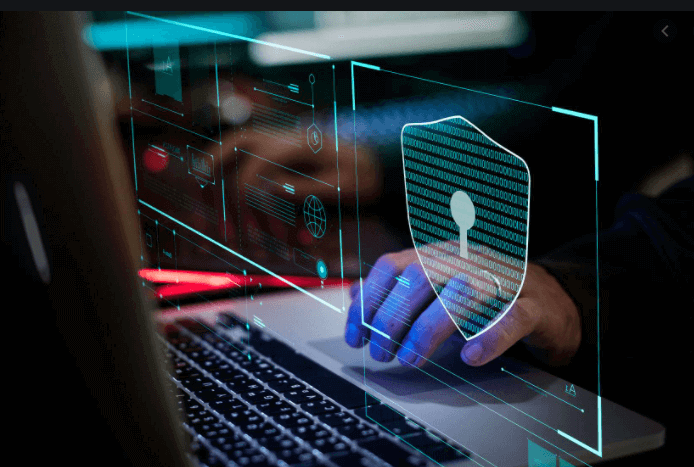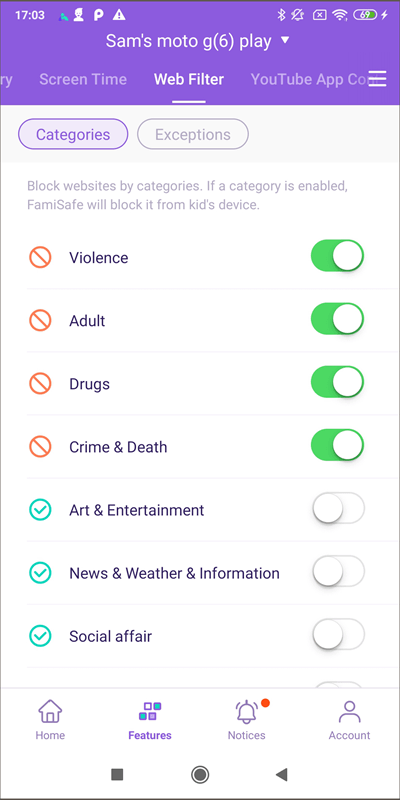How to Prevent Cyber-Crimes and Protect Your Kids Online?
Prevent Cyber-Crimes and Protect Your Kids Online?
ALL TOPICS
- iPhone Parenting
- iPad Parenting
- iPod Parenting
Sep 11, 2024 Filed to: Parent's Guide Proven solutions
With COVID-19 ravaging the world and most learning institutions closed, it means that the internet is now the preferred educational resource centre. Your school-going child can use their internet-connected device to research, submit assignments, connect with the teacher, and so on. But as good as it sounds, there are thousands or even millions of cyber-crimes committed every day. Therefore, parents should make sure that their children are safe online. Keep reading to learn a few cybercrime protection tips!

What Is Cybercrime?
Cybercrime is a criminal activity undertaken by hackers or cyber criminals targeting a networked device or a computer network. In most cases, cybercriminals have the sole aim of making quick money, although some may damage your computer with malware attacks. Typically, this group is well-organized and uses advanced technologies to break into your computer network and steal vital data.
Common Types of Cybercrime
1. Identity Theft
This one is the most common type of cybercrime. Here, the hacker accesses the computer or mobile phone network illegally, intending to steal the user's personal information. This information can be financial data, residential address, phone number, and so on. Most sell these data to the black market.
2. Credit Card Fraud

This type of cybercrime happens when criminals access a retailer's system and steal credit cards or other clients' financial information. Again, the stolen financial data is sold in the darknet market who siphon money from the credit cards.
3. Phishing Scams
Phishing is another standard cybercrime activity that has happened to almost every internet user. In this case, scammers will try to trick you into giving them your personal information like credit card numbers, ID numbers, financial account passwords, etc. Scammers will usually contact you through email, texts, phone calls, and social media DMs.
4. Software Piracy
Thanks to internet technology, you can download almost any software, movie, picture, or song online. And guess what? Most of them are available for free. However, most free software and media content are usually pirated. Although using free pirated software can be tempting, it has multiple risks like worms, trojans, viruses, and more. So, be careful with what you download online.

5. Cyberbullying
Cyberbullying is when an individual or people send you a barrage of abusive, harmful, and offensive messages. It can also be posting nasty videos or images online that target a specific individual. Some cyberbullies even go as far as creating duplicate accounts to post harmful content or send abusive messages. Many a time, cyberbullying happens on social media channels.
6. Cyber-Stalking
The primary victims of cyber-stalking are usually teens and young adults. Usually, the stalker and the victim know each other. It could be a jilted ex-lover out for revenge or a secret admirer. The stalker usually sends the victim a batch of emails or online messages that qualify as harassment. Just look at it as ordinary stalking.

Click here to learn the most common cybercrimes and cases.
Effects of Cyber-Crimes on Your Child
Some cybercrime activities like cyber-bullying and cyber-stalking can negatively affect your child. Below is how:
1. Low Self-Esteem
As said, cyberbullies and cyberstalkers often send their victims messages to make them feel vulnerable and miserable. For example, a kid who feels insecure about their birthmark or name may end up being bullied about it. In short, online bullying can plummet your child's self-esteem. As a result, your child can start doubting his/her self-worth and value.
2. Poor Academic Performance
A child who feels harassed online may become disinterested in school work. Bullied kids may skip school or online classes to avoid facing bullies. In return, their grades will suffer due to absenteeism and lack of concentration in class.

3. Depression and Anxiety
Cyberbullying victims can succumb to depression, anxiety, and other stress-related conditions. The stress of dealing with cyberbullies regularly can eliminate the feeling of contentment and happiness. Simply put, cyberbullying erodes self-worth and self-confidence, which is the leading cause of anxiety and depression.
4. Anger
If you notice your child is often becoming angry over minor issues, cyberbullying may be the cause. Some cyberbullied kids can start plotting revenge in retaliation. Besides getting into trouble with the law, feeling vengeful can lock your child into the bully-victim cycle. In other words, a bully victim is a child who is both a victim and a bully.
5. Isolation
Cyberbullying and cyberstalking can make your child feel excluded at school. When your child feels alone, they may start isolating themselves. Remember that making friends is vital at this stage. If your child doesn't have friends, it can lead to even more bullying.

Tried and True Cybercrime Protection Tips
1. Provide an Open Communication Channel
First of all, encourage your child to come to you whenever they have any questions about their home, school, or online activity. If your child requests that you get them a computer, phone, or social media account, talk about the responsibilities that accompany the privilege. Together, design a "Terms and Conditions" detailing the behavior you expect from him or her. Overall, teach your child how to act responsibly both at school, home, and online.
2. Teach Your Child Not to Respond to Cyberbullies
This is somewhat an extension of the first point. Parents should teach their children not to respond to inappropriate online texts or cyberbullies. Show them how to spot online bullies from afar and advise them not to delete the messages. That's because you'll need to verify if the messages are genuinely cyberbullying before taking appropriate action.

3. Tell Your Child Not to Give Out Personal Information
Still on educating your child, teach them not to visit unsuspecting websites and give out vital information like residential address, credit card number, and more. That's because cybercriminals can exploit your child's innocence to steal every coin in your credit card.
4. Encourage Use of Computers and Mobile Phones in Open Spaces
Most parents make the mistake of allowing their children to use their desktops or computers in closed spaces like bedrooms. Unfortunately, doing this prevents you from knowing what your child is doing online. So, make sure that computer and mobile device use is in open areas around the home. Also, remember to lead by example.
5. Don't Blame Your Child
If your child is a victim of cybercrimes, always be understanding and supportive. If it's cyberbullying, start by finding out how long the behavior has been ongoing and find a lasting solution to it. In case they are lured into giving out your credit card or financial details online, don't overreact by blaming them. Instead, let your child know that everybody makes mistakes but learning from them is the key issue.
6. Install Antivirus and Malware Detectors
Although computers come with inbuilt antivirus programs, you may need to download one for your child's mobile phone. With an intelligent antivirus program, parents can rest easy knowing their children won't install malicious programs or visit dangerous websites. In addition to that, make sure your child's device is up to date. That's because the latest system updates come with improve security surveillance features.

7. Exploit Parental Control Features and Apps
Most computers and smartphones have parental control features to prevent some form of cybercrimes and excessive screentime. But because the inbuilt features are pretty limited, it's best to get a third-party parental control app. This way, you can remotely manage your child's online activities and take appropriate action whenever you see suspicious actions.
<What is FamiSafe and How Can It Help?
Up to this point, you're probably wondering what is the best app to manage your child's online activities without breaking a sweat. Well, choose Wondershare FamiSafe. With this app, parents can monitor their children's digital endeavors by getting information about their time using their devices and doing what. This software will also give you detailed information about the apps your child likes using and the amount of time they spend using them. You can also monitor their social media text messages and comments to know whether your child is suffering from cyberbullying.
- Web Filter & SafeSearch
- Screen Time Limit & Schedule
- Location Tracking & Driving Report
- App Blocker & App Activity Tracker
- YouTube History Monitor & Video Blocker
- Social Media Texts & Porn Images Alerts
- Works on Mac, Windows, Android, iOS, Kindle Fire
Below are a few FamiSafe features that can help combat cybercrimes:
- Limit Screen Time – Installing FamiSafe on your phone and that of your child lets you know the time they spend using their phone or computer and on which apps. The data is available on a daily, weekly, or monthly basis. After that, you can choose to disable the device screen or block the addictive app. This feature allows parents to limit phone or computer use during bedtime or when their children need to complete specif tasks.
- Web Filter – Most of the time, hackers and other cybercriminals are likely to pitch tents in websites displaying unethical content. But fortunately, Wondershare FamiSafe can help sieve these websites using the web filter feature. Parents can filter websites based on categories like phishing, drugs, gambling, adult, violence, and more. You can also view your child's browser history, including when they are browsing in incognito mode.

- Detect Inappropriate Texts – Finally, use this app to monitor what your child is doing on social media channels and YouTube. You can check into your child's social media accounts like Facebook, Instagram, Twitter, Gmail, and more. The app allows parents to set specific keywords which they'll use to monitor their children's DMs and comments without raising a finger.
Cybercrimes are definitely here to stay. Therefore, it's vital to be proactive instead of waiting until the damage is done to take the appropriate action. Start by educating your child about the dangers lurking in the vast online world and then protect them using a reliable antivirus program. And yes, let Wondershare FamiSafe be your eyes whenever you're away from your child.

Moly Swift
staff Editor